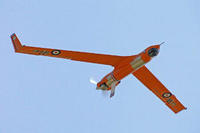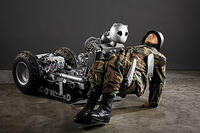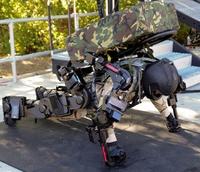-
U.S. conducted bioweapon tests in Japan in early 1960s
The U.S. Army tested biological weapons in Okinawa, Japan in the early 1960s when the United States ruled the prefecture. U.S documents confirmed that the tests, conducted at least a dozen times occurred between 1961 and 1962. The test involved releasing rice blast fungus over rice paddies in order to measure the agent’s effect on production. With hundreds of millions of people dependent on rice as a staple food, failure of rice production could result in mass starvation. The fungus infects crops naturally, and experts estimate it destroys enough rice to feed sixty million people a year.
-
-
Surviving a nuclear explosion in your city

During the cold war, scientists modeled every imaginable consequence of a nuclear explosion. Michael Dillon, a Lawrence Livermore Lab mathematician, found a gap in the sheltering strategies for people far enough from ground zero to survive the initial blast but close enough to face deadly radioactive fallout. Dillon’s model’s addresses the most vulnerable people, those who found shelter from the blast in lightweight buildings, or buildings lacking a basement (these buildings are more easily penetrated by deadly radioactive dust). His recommendations: if adequate shelter is fifteen minutes away, people should remain in their initial, poor-quality shelter no longer than thirty minutes after detonation. If the better shelter is only five minutes away, however, individuals should move there immediately, leaving the closer but unsafe buildings altogether.
-
-
Autonomous drones to help in search and rescue, disaster relief

Research could soon enable unmanned aerial vehicles (UAVs) to track down missing persons on search-and-rescue missions, to penetrate curtains of smoke during wildfire suppression, or possibly even to navigate urban landscapes on delivery runs for online retailers like Amazon. It all could be done autonomously with a human acting only as a supervisor. “Drones have gotten a very bad rap for various reasons,” says Kelly Cohen, associate professor of aerospace engineering and engineering mechanics at the University of Cincinnati. “But our students see that unmanned systems can have a positive impact on society.”
-
-
Carbon nanotubes improve flame-resistant coating
Using an approach akin to assembling a club sandwich at the nanoscale, researchers have succeeded in crafting a uniform, multi-walled carbon-nanotube-based coating that greatly reduces the flammability of foam commonly used in upholstered furniture and other soft furnishings. In tests, the flammability of the nanotube-coated polyurethane foam was reduced 35 percent compared with untreated foam. As important, the coating prevented melting and pooling of the foam, which generates additional flames that are a major contributor to the spread of fires.
-
-
NSA’s bulk collection programs’ contribution to thwarting terrorism minimal: study
There are two questions about the NSA’s bulk information collection programs: are these programs legal? Are they effective? On the second questions, supporters of the programs say these surveillance measures are essential, and as proof they claim these programs helped thwart more than fifty potential terrorist attacks in more than twenty countries around the world. A new in-depth analysis shows, however, that these claims are overblown and even misleading. The study of 225 individuals recruited by al-Qaeda, or a like-minded group, or inspired by al-Qaeda’s ideology, and charged in the United States with an act of terrorism since 9/11, demonstrates that traditional investigative methods provided the initial impetus for investigations in the majority of cases, while the contribution of NSA’s bulk surveillance programs to these cases was minimal.
-
-
Iconic Doomsday Clock remains at five minutes to midnight

Bulletin of the Atomic Scientists: It is still five minutes to midnight — and much too close to doomsday. The minute hand of the Bulletin’s iconic Doomsday Clock has been at five minutes to midnight since January 2012. In explaining why the hand would remain so close to figurative doomsday, the Bulletin’s science and security experts focused on the failure of world leaders to take action which would reduce the possibility of catastrophe related to nuclear weapons and climate change.
-
-
B61-11 earth-penetrating weapon tested for first time in seven years
One of the main purposes of the U.S. nuclear stockpile is deterrence, and one important way to assure deterrence is to have a successful surveillance test that shows that the systems in the stockpile work. Sandia’s annual surveillance program for each weapon type consists of flight tests, lab tests, and component and material tests. On 20 November 2013, researchers conducted a rocket-driven impact test of the nonnuclear components of the B61-11 earth-penetrating weapon, the first such test in seven years. Flight tests subject the weapon to shock, vibration, temperature, rotation, weather, and more. Sandia pulls random units from the stockpile for tests.
-
-
Robots compete in performing emergency response task

Sixteen robots participating in the DARPA Robotics Challenge Trials last month performed such tasks as opening doors or climbing a ladder, all tasks aimed to speed the development of robots that could one day perform a number of critical, real-world, emergency response tasks at natural and human-made disaster sites. While most of the entries were engineered to resemble humanoids with two legs, JPL’s RoboSimian tackled tasks like climbing over rough terrain on all four of its limbs.
-
-
California bill would restrict selling, access to LPR-collected data
A bill before the California State Senate would to prohibit law enforcement agencies and private firms in California from selling data collected by automatic license plate readers. (LPRs). The proposed Senate Bill 893 would prohibit LPR operators from selling data to non-law enforcement agencies or to non-law enforcement officials. Law enforcement access to LPR data retained for more than five years would require a court order.
-
-
Interim nuclear agreement with Iran goes into effect 20 January
The United States and the EU announced Sunday that on 20 January Iran will start implementing November’s “comprehensive agreement.” One of the main clauses in the agreement calls for Iran to begin eliminating its stockpile of highly enriched uranium – that is, uranium enriched to 20 percent or higher — in eight days’ time from the start date. In addition to eliminating its stockpile of 20 percent enriched uranium before the end of January, Iran will also freeze other aspects of its nuclear program, accept more rigorous inspections of its nuclear facilities, and disable the cascade that produces 20 percent-enriched uranium. In exchange, Iran would receive some the relief from the sanctions, providing a $7 billion boost to the Iranian economy. The bulk of relief is in the shape of $4.2 billion in restricted Iranian assets which will be repatriated to Tehran in regular instalments throughout the six months until the deal concludes in July.
-
-
Experts named to first-ever National Commission on Forensic Science
The U.S. Department of Justice and the U.S. Department of Commerce’s National Institute of Standards and Technology (NIST) last week announced appointments to a newly created National Commission on Forensic Science. Members of the commission will work to improve the practice of forensic science by developing guidance concerning the intersections between forensic science and the criminal justice system.
-
-
U.S. disaster preparedness threatened by funding problems
The 9/11 attacks in New York City prompted large increases in government funding to help communities respond and recover after man-made and natural disasters. This funding, however, has fallen considerably since the economic crisis in 2008. Furthermore, disaster funding distribution is deeply inefficient: huge cash infusions are disbursed right after a disaster, only to fall abruptly after interest wanes. These issues have exposed significant problems with our nation’s preparedness for public health emergencies. Researchers list seven recommendations to enhance preparedness for public health emergencies in the U.S.
-
-
Police still use sketch artists despite advances in surveillance technology
Despite the growing use of surveillance technology to monitor public and private spaces, some law enforcement departments still rely on composite sketches to help solve crimes. Some police departments are continuing the use of hand-drawn sketches because they are the only available method to identify suspects, but some departments are continuing to use the tool for nostalgia.
-
-
New phone alerts for extreme weather events may prevent casualties in India
India has a mobile phone subscriber base exceeding 929 million people and this is expected to touch 1.15 billion by the end of 2014. An alert system developed for mobiles could reach an estimated 97 percent of the population. Computer science undergraduates have created image-based mobile phone alerts, connected to the Weather Research and Forecasting system.
-
-
Military technology outpaces laws of war

Today’s emerging military technologies — including unmanned aerial vehicles, directed-energy weapons, lethal autonomous robots, and cyber weapons like Stuxnet — raise the prospect of upheavals in military practices so fundamental that they challenge long-established laws of war. Weapons that make their own decisions about targeting and killing humans, for example, have ethical and legal implications obvious and frightening enough to have entered popular culture (for example, in the Terminator films). The current international laws of war were developed over many centuries and long before the current era of fast-paced technological change.
-
More headlines
The long view
Factories First: Winning the Drone War Before It Starts
Wars are won by factories before they are won on the battlefield,Martin C. Feldmann writes, noting that the United States lacks the manufacturing depth for the coming drone age. Rectifying this situation “will take far more than procurement tweaks,” Feldmann writes. “It demands a national-level, wartime-scale industrial mobilization.”
How Male Grievance Fuels Radicalization and Extremist Violence
Social extremism is evolving in reach and form. While traditional racial supremacy ideologies remain, contemporary movements are now often fueled by something more personal and emotionally resonant: male grievance.
The Surprising Reasons Floods and Other Disasters Are Deadlier at Night
It’s not just that it’s dark and people are asleep. Urban sprawl, confirmation bias, and other factors can play a role.
Why Flash Flood Warnings Will Continue to Go Unheeded
Experts say local education and community support are key to conveying risk.
